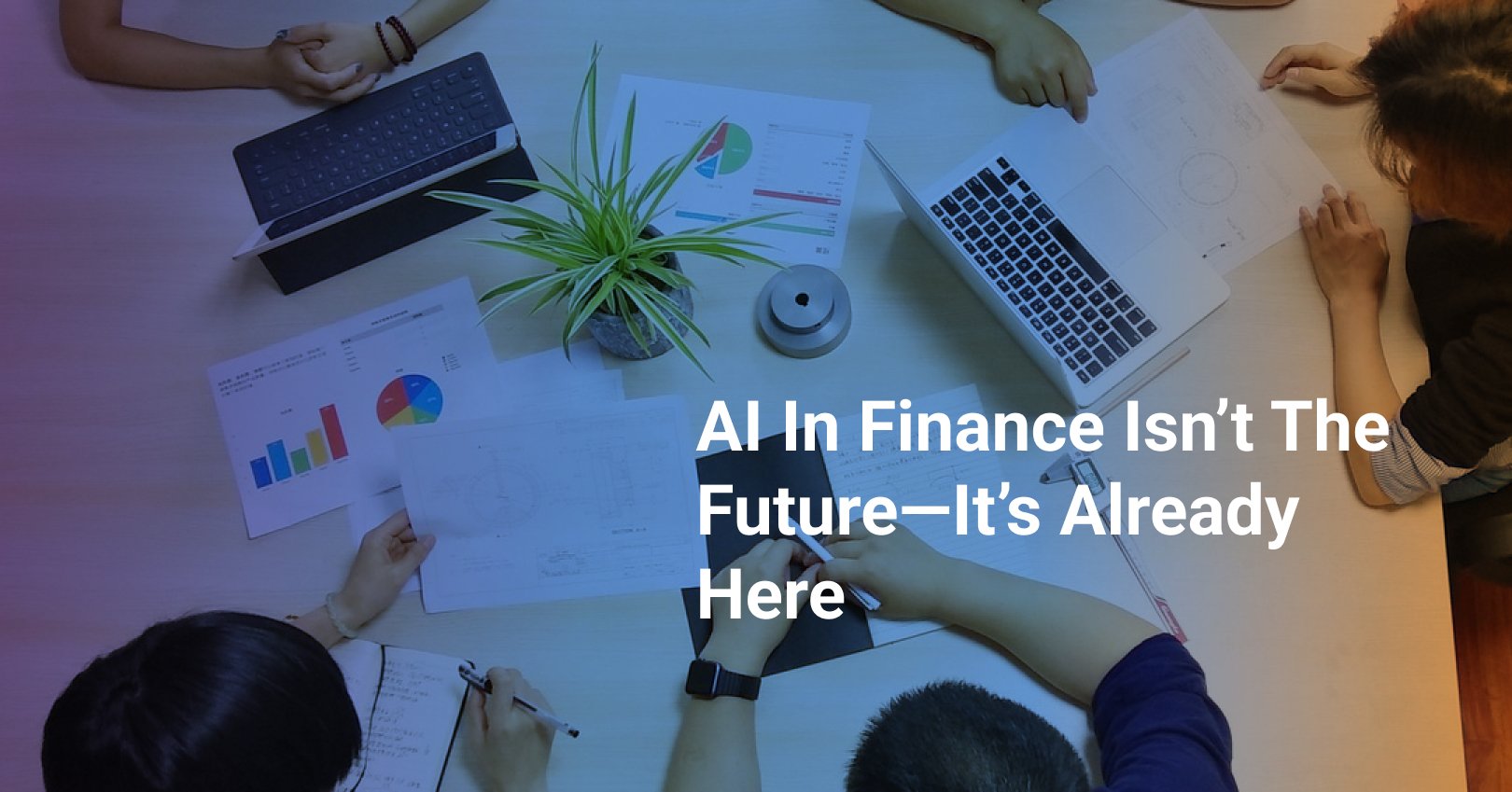Refill Reminders Automation to Improve Adherence and Outcomes
One missed dose may not look like much, but they add up to impact hundreds of thousands of patients' health and trickle downstream through the entire...

The finance industry runs on accuracy, speed, and trust, and AI is quietly changing how all three are managed. What used to take hours of manual work now happens in minutes. Tasks like invoice matching, fraud detection, and financial forecasting are handled faster and more reliably, often without human involvement.
Finance teams are closing books sooner, catching issues before they escalate, and spending far less time buried in spreadsheets. The benefits of using AI in finance are becoming hard to ignore, giving more room to focus on strategic decisions rather than being stuck in spreadsheets.
Today, we'll take a closer look at how AI is reshaping financial operations, where it’s making the biggest difference, and what finance teams stand to gain.
Finance teams are drowning in data they never had to deal with before. Every mobile payment, online transaction, and digital loan application creates information that needs processing.
10 years ago, most banking happened in branches with paper forms. Now, customers expect instant everything: loan approvals in minutes, fraud alerts within seconds, and answers to account questions at 2 AM on weekends.
Meanwhile, regulators keep adding new reporting requirements with tighter deadlines. You can't handle this volume manually anymore.
The economics don't work without automation. Good finance people are hard to find and expensive to hire. Everyone's competing for the same talent pool while trying to cut costs.
Fintech startups process loans in hours while traditional banks take weeks. Customers notice the difference and switch. Your team either adopts AI to stay competitive or gets left behind by companies that can approve credit applications while you're still printing forms.
Finance teams are finding that AI solves problems they've dealt with for years. Here's what AI actually does for teams trying to get their work done faster and with fewer headaches.
Your team probably spends way too much time on tasks that can be easily automated. Bank reconciliation used to mean someone sitting there matching transactions line by line. Now the software does it automatically and only flags the priority cases that require a human specialist. Same with invoices. The AI reads them, pulls out vendor names and amounts, and drops everything into your accounting system.
That three-hour data entry marathon your AP person does every week? It happens in about ten minutes now. Monthly journal entries just post themselves based on rules you set up once. Your finance team can actually focus on the work that requires thinking instead of mindless data pushing.
Nobody wants to wait until Monday morning to find out if their payment went through. AI chatbots answer these questions instantly, even at midnight on weekends. They pull up actual account information and give real answers, not just "please contact customer service during business hours."
When clients ask about invoice status or payment schedules, they get immediate responses with specific details. Your customer service team handles the complex problems while AI takes care of the routine tasks like balance inquiries and transaction history.
Manual work means mistakes, and mistakes in finance cost money. People transpose numbers, miss decimal points, or use the wrong formulas in spreadsheets.
AI doesn't have bad days or get distracted during repetitive tasks. It catches duplicate payments before they go out. It spots missing documentation before invoices get processed. Your month-end reports stay clean because the AI handles calculations the same way every single time.
Risk shows up in patterns that are hard to spot when you're looking at individual transactions. AI watches thousands of data points simultaneously and catches warning signs that human employees miss.
Credit decisions get better because the system considers payment history, cash flow trends, and current market conditions all at once.
Compliance monitoring happens continuously instead of during quarterly reviews. The AI system flags problematic transactions immediately, not after they've already caused regulatory issues.
Fraudsters are creative, but they leave patterns. That’s where the benefit of AI in finance becomes clear. AI-driven systems learn how each customer normally spends money, then spot when something doesn't fit. A credit card used in Tokyo an hour after a purchase in Chicago triggers immediate blocking and alerts.
The system adapts to new fraud schemes faster than you can write new rules to catch them. It identifies sophisticated attacks like account takeovers and fake identity creation that slip past traditional monitoring. Similarly, banks catch fraud attempts in seconds instead of discovering them days later through customer complaints.
Less manual work means fewer people are needed to handle the same workload. You don't need temp staff for month-end closing when automated systems handle most of the processing. Invoice approvals, expense reports, and routine customer questions don't require human intervention anymore.
For any banking or financial institution, the benefits are immediate. Processing costs drop significantly when AI handles the volume. Your team spends time on analysis and strategy instead of data entry and verification. Your AI systems typically pay for themselves within months through reduced labor costs and faster turnaround times.
AI knows what customers actually do with their money, not just what they say they want. Banking apps suggest realistic savings goals based on actual spending patterns. Investment platforms recommend adjustments that match proven risk tolerance, not survey responses.
Credit card companies offer rewards that align with where people actually spend money. Personal finance tools give budgeting advice based on real transaction data instead of generic templates. Hence, customers get recommendations that make sense for their specific financial situation.
Predicting the future gets easier when you have more data to work with. AI considers seasonal patterns, economic indicators, and historical performance to project upcoming needs.
AI-driven projections, furthermore, update automatically as new information becomes available. This gives you better visibility into what's actually going to happen instead of best-case scenarios.
AI finds patterns in your financial data that inform big decisions. You discover which products really make money and which customers cost more to serve than they're worth.
Doing such market analysis reveals pricing opportunities and expansion possibilities you might have missed. Additionally, performance dashboards highlight trends in key metrics on a single screen before they become problems.
Pretty much every type of financial business can use AI to solve daily problems. Banks are using it to approve loans faster and catch fraudulent transactions before they go through. Credit unions compete better with big banks by automating member applications and account setup.
Investment firms let AI analyze portfolios and spot market trends that humans might miss. Insurance companies process claims in hours instead of weeks and catch fake claims that would have slipped through manual review.
Accounting firms handle way more clients without hiring extra staff by automating routine bookkeeping and tax prep work. Fintech companies build AI right into their apps to give instant loan decisions and personalized money advice.
Wealth managers use it to track market changes and adjust client portfolios automatically. Even solo financial advisors benefit from AI that handles client check-ins and monitors investment performance while they focus on building relationships.
Implementing AI in finance isn't as simple as buying software and flipping a switch. Finance teams run into real problems that can derail projects and waste budgets. Here are the biggest headaches you'll face and how to deal with them.
Most AI companies show you flashy demos with perfect data and ideal scenarios. Then you try to use their solution, and everything falls apart. A right partner like Mosaicx actually gets finance. They've worked with accounting teams, not just IT departments.
When you explain that your AP process needs to handle three-way matching with PO exceptions, they know what you're talking about. They won't try to sell you a chatbot when you need invoice automation. The team has built tools specifically for finance workflows instead of trying to adapt generic business software.
Your financial data is basically a treasure map for hackers. Bank account numbers, social security numbers, transaction details; one breach and you're explaining to regulators why customer information ended up on the dark web. Additionally, your own financial reports contain sensitive information that competitors would love to get their hands on.
That’s why the benefits of AI in finance must go hand in hand with airtight security. You must only trust vendors take take security concerns seriously. Mosaicx, for example, does this with a track record to show. Everything gets encrypted when it's moving between systems and when it's sitting in storage.
Their platform meets SOC 2 standards, which means independent auditors have verified their security practices. You, on the other hand, get detailed logs showing who accessed what data and when.
Financial regulations are a maze, and adding AI makes it worse. Regulators want to know exactly how your AI makes decisions, especially for anything involving credit or risk assessment.
This is where the benefits of AI in finance must include transparency and traceability. You need audit trails, documentation, and the ability to explain why the system approved one loan but denied another. "The algorithm said so" doesn't satisfy compliance officers.
Mosaicx builds compliance into their AI from the start instead of bolting it on later. The system automatically logs every decision and keeps track of which data influenced each outcome.
When auditors show up asking questions, you can pull reports showing exactly how the AI processed each transaction. The transparency helps you stay compliant without hiring extra staff to document everything manually.
Your accounting software speaks a different language than your reporting tools. Adding AI to this only creates a mess, especially if you're running legacy systems. Replacing the entire system can be quite an expensive ordeal, assuming they don't cause any major service disruptions.
Mosaicx works with what you have instead of demanding you replace everything. Their platform connects to old systems through APIs that translate between different data formats.
Hence, you can add AI piece by piece, starting with invoice processing, adding expense management, and then moving to forecasting. Each module works independently, so problems in one area don't crash everything else.
You don’t want to discover at the eleventh hour how initial quotes multiply when you discover you need data migration, custom integrations, and six months of training. ROI calculations become wild guesses when you don't know if the AI will actually reduce processing time or just create different work.
Mosaicx gives you real numbers upfront instead of lowball estimates that balloon later. They help you identify specific metrics to track, like reducing invoice processing from 3 days to 3 hours, or cutting month-end close time by 40%. You'll get to know if the AI actually works in your environment before signing long-term contracts.
Still relying on spreadsheets and end-of-month marathons? You’re not alone, but you don’t have to stay there. AI isn’t some far-off future. It’s already helping finance teams reduce workload, cut costs, and gain clarity where it matters most. And with Mosaicx, getting started is easy. Our solutions are tailored, secure, and built to deliver real results from day one.
If you're ready to stop patching problems and start transforming how your team works, now’s the time. Book a demo and explore what our conversational AI can do for you.
The right AI solution won’t just improve your workflow, it’ll change the way your finance team operates for good. Let’s talk.

One missed dose may not look like much, but they add up to impact hundreds of thousands of patients' health and trickle downstream through the entire...

Every day in a pharmacy comes down to balance. Your team juggles accuracy and efficiency, compliance and safety, paperwork and patient care, all at...
.png)
When customers call, they want to be heard now, not wait. However, if there's no visibility into what's happening across queues, agents, and...